The Cambridge History of Japan, Vol. 4: Early Modern Japan
Подождите немного. Документ загружается.

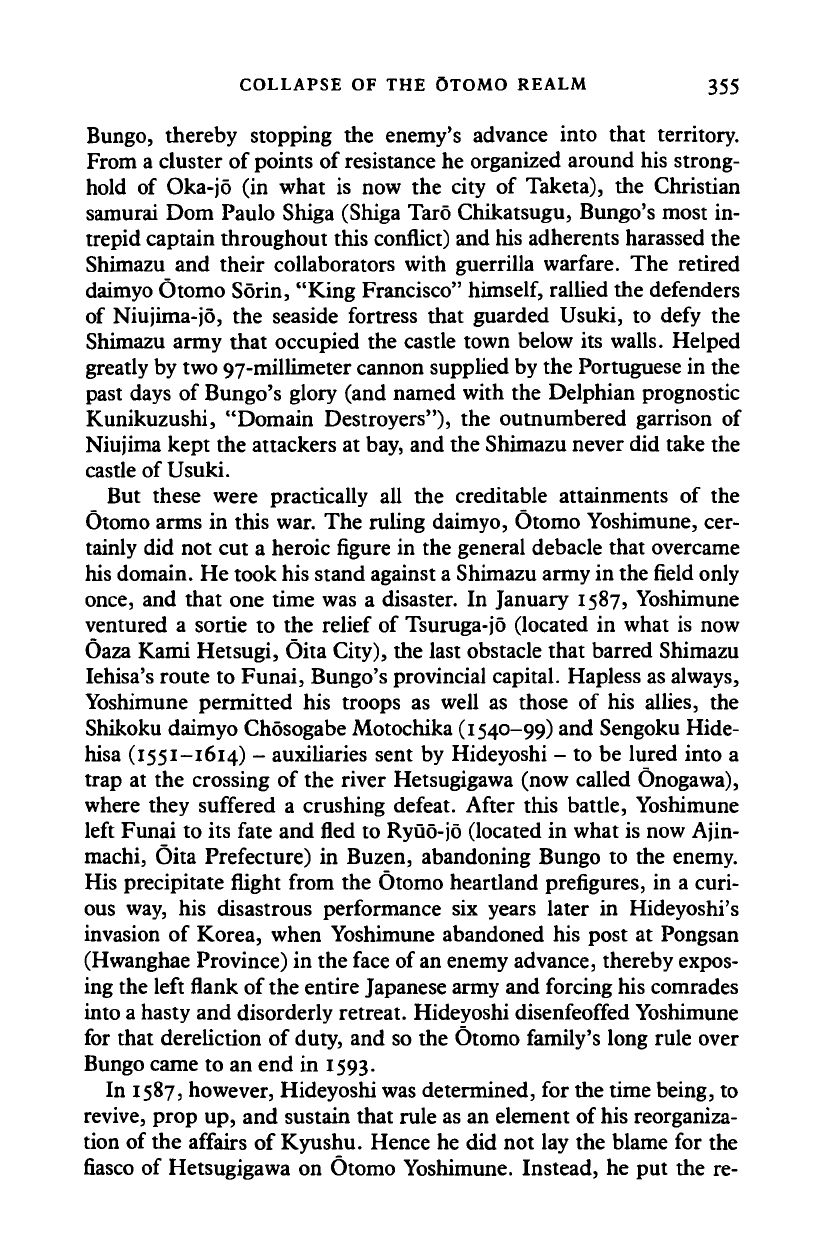
COLLAPSE OF THE OTOMO REALM 355
Bungo, thereby stopping the enemy's advance into that territory.
From a cluster of points of resistance he organized around his strong-
hold of Oka-jo (in what is now the city of Taketa), the Christian
samurai Dom Paulo Shiga (Shiga Taro Chikatsugu, Bungo's most in-
trepid captain throughout this conflict) and his adherents harassed the
Shimazu and their collaborators with guerrilla warfare. The retired
daimyo Otomo Sorin, "King Francisco"
himself,
rallied the defenders
of Niujima-jo, the seaside fortress that guarded Usuki, to defy the
Shimazu army that occupied the castle town below its walls. Helped
greatly by two 97-millimeter cannon supplied by the Portuguese in the
past days of Bungo's glory (and named with the Delphian prognostic
Kunikuzushi, "Domain Destroyers"), the outnumbered garrison of
Niujima kept the attackers at bay, and the Shimazu never did take the
castle of Usuki.
But these were practically all the creditable attainments of the
Otomo arms in this war. The ruling daimyo, Otomo Yoshimune, cer-
tainly did not cut a heroic figure in the general debacle that overcame
his domain. He took his stand against
a
Shimazu army in the
field
only
once,
and that one time was a disaster. In January 1587, Yoshimune
ventured a sortie to the relief of Tsuruga-jo (located in what is now
Oaza Kami Hetsugi, Oita City), the last obstacle that barred Shimazu
Iehisa's route to Funai, Bungo's provincial capital. Hapless as always,
Yoshimune permitted his troops as well as those of his allies, the
Shikoku daimyo Chosogabe Motochika (1540-99) and Sengoku Hide-
hisa (1551-1614)- auxiliaries sent by Hideyoshi - to be lured into a
trap at the crossing of the river Hetsugigawa (now called Onogawa),
where they suffered a crushing defeat. After this battle, Yoshimune
left Funai to its fate and fled to Ryuo-jo (located in what is now Ajin-
machi, Oita Prefecture) in Buzen, abandoning Bungo to the enemy.
His precipitate flight from the Otomo heartland prefigures, in a curi-
ous way, his disastrous performance six years later in Hideyoshi's
invasion of Korea, when Yoshimune abandoned his post at Pongsan
(Hwanghae Province) in the face of an enemy advance, thereby expos-
ing the left flank of the entire Japanese army and forcing his comrades
into a hasty and disorderly retreat. Hideyoshi disenfeoffed Yoshimune
for that dereliction of duty, and so the Otomo family's long rule over
Bungo came to an end in 1593.
In 1587, however, Hideyoshi was determined, for the time being, to
revive, prop up, and sustain that rule as an element of his reorganiza-
tion of the affairs of Kyushu. Hence he did not lay the blame for the
fiasco of Hetsugigawa on Otomo Yoshimune. Instead, he put the re-
Cambridge Histories Online © Cambridge University Press, 2008
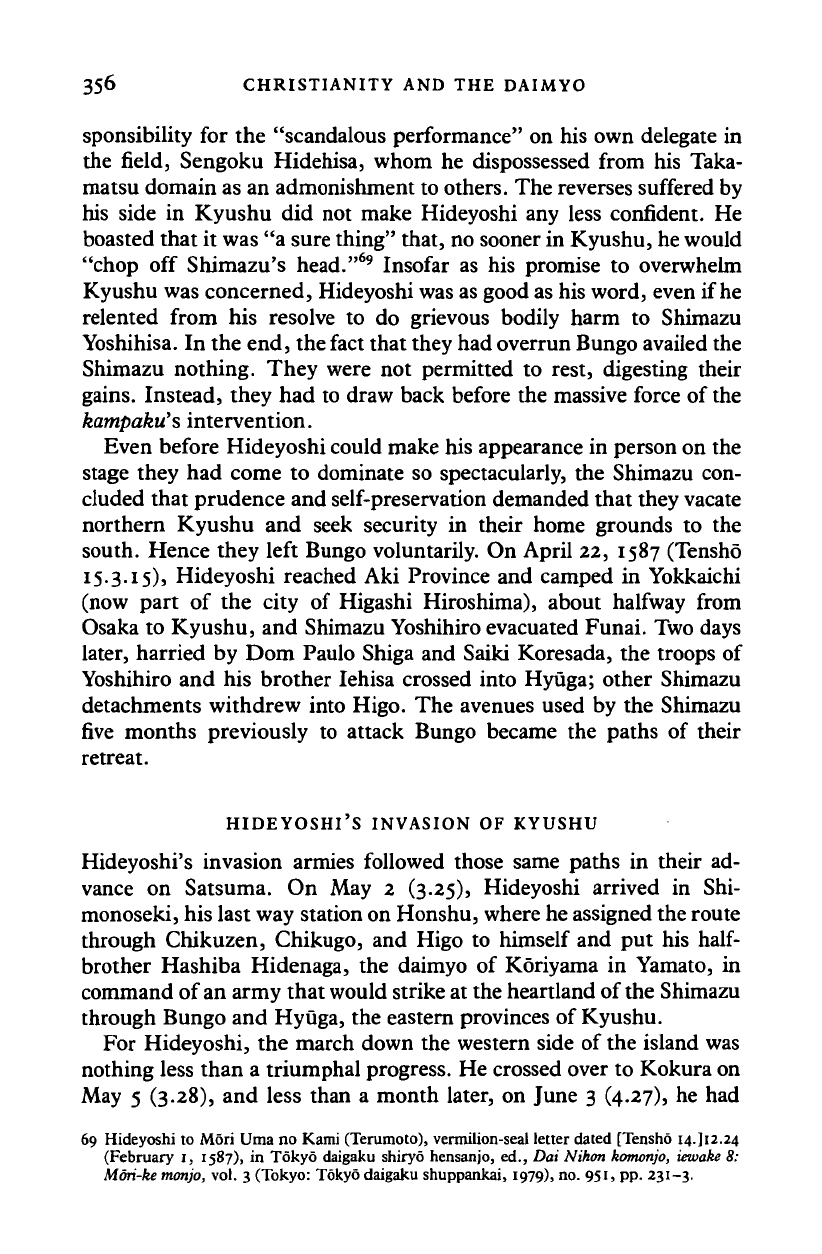
356 CHRISTIANITY AND THE DAIMYO
sponsibility
for the
"scandalous performance"
on his
own delegate
in
the field, Sengoku Hidehisa, whom
he
dispossessed from
his
Taka-
matsu domain as an admonishment to others. The reverses suffered by
his side
in
Kyushu
did not
make Hideyoshi
any
less confident.
He
boasted that
it
was
"a
sure thing" that, no sooner in Kyushu, he would
"chop
off
Shimazu's head."
69
Insofar
as his
promise
to
overwhelm
Kyushu was concerned, Hideyoshi was as good as his word, even if he
relented from
his
resolve
to do
grievous bodily harm
to
Shimazu
Yoshihisa.
In
the end, the fact that they had overrun Bungo availed the
Shimazu nothing. They were
not
permitted
to
rest, digesting their
gains.
Instead, they
had to
draw back before the massive force
of
the
kampaku's intervention.
Even before Hideyoshi could make his appearance
in
person on the
stage they
had
come
to
dominate
so
spectacularly,
the
Shimazu
con-
cluded that prudence and self-preservation demanded that they vacate
northern Kyushu
and
seek security
in
their home grounds
to the
south. Hence they left Bungo voluntarily.
On
April 22, 1587 (Tensho
l
5-3-
l
5)> Hideyoshi reached
Aki
Province
and
camped
in
Yokkaichi
(now part
of the
city
of
Higashi Hiroshima), about halfway from
Osaka
to
Kyushu,
and
Shimazu Yoshihiro evacuated Funai. Two days
later, harried
by Dom
Paulo Shiga
and
Saiki Koresada,
the
troops
of
Yoshihiro
and his
brother Iehisa crossed into Hyuga; other Shimazu
detachments withdrew into Higo.
The
avenues used
by the
Shimazu
five months previously
to
attack Bungo became
the
paths
of
their
retreat.
HIDEYOSHl'S INVASION OF KYUSHU
Hideyoshi's invasion armies followed those same paths
in
their
ad-
vance
on
Satsuma.
On May 2
(3.25), Hideyoshi arrived
in Shi-
monoseki, his last way station on Honshu, where he assigned the route
through Chikuzen, Chikugo,
and
Higo
to
himself
and put his
half-
brother Hashiba Hidenaga,
the
daimyo
of
Koriyama
in
Yamato,
in
command of an army that would strike at the heartland of the Shimazu
through Bungo
and
Hyuga, the eastern provinces
of
Kyushu.
For Hideyoshi,
the
march down
the
western side
of
the island was
nothing less than
a
triumphal progress. He crossed over
to
Kokura on
5 (3.28),
and
less than
a
month later,
on
June
3
(4.27),
he had
69 Hideyoshi
to
Mori Uma
no
Kami (Terumoto), vermilion-seal letter dated [Tensho 14.J12.24
(February
1,
1587),
in
Tokyo daigaku shiryo hensanjo, ed., Dai
Nihon
komonjo,
iewake
8:
M6ri-ke
monjo,
vol. 3 (Tokyo: Tokyo daigaku shuppankai, 1979), no.
951,
pp.
231-3.
Cambridge Histories Online © Cambridge University Press, 2008
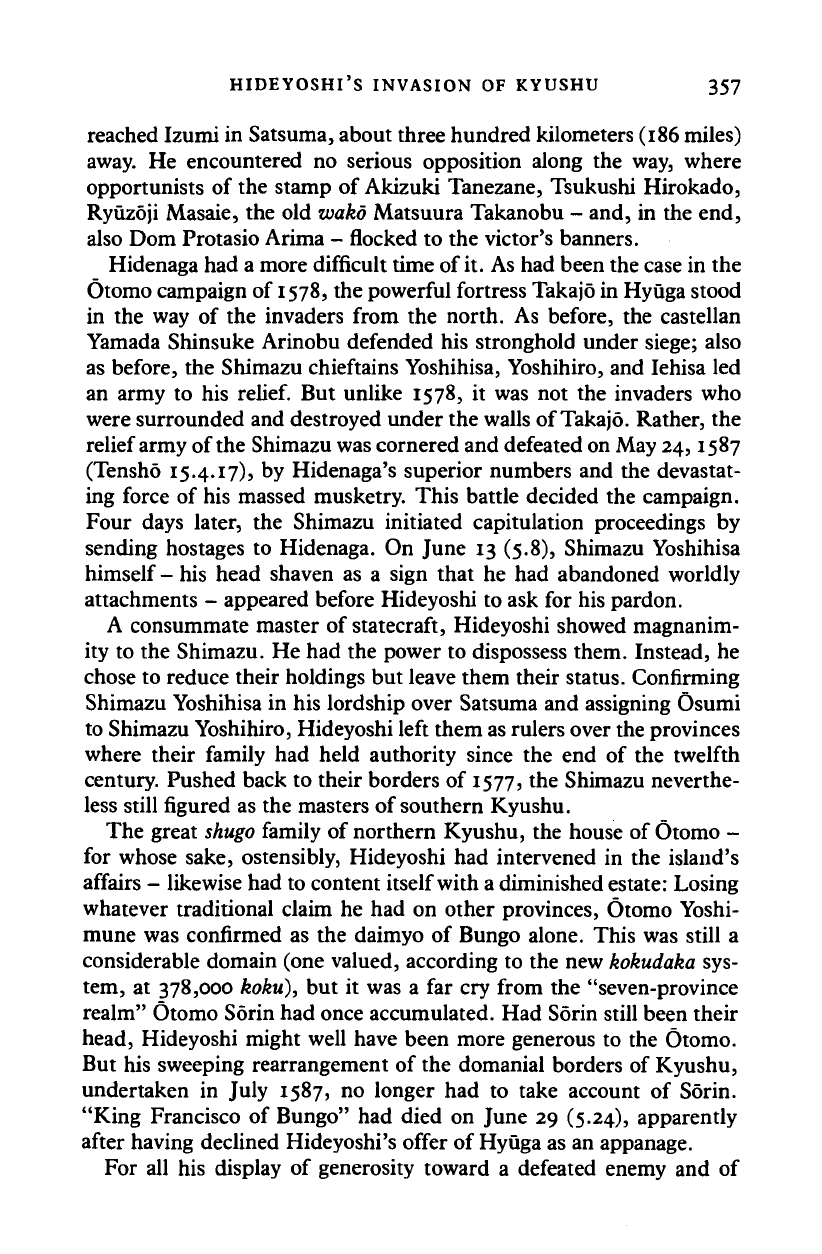
HIDEYOSHl'S INVASION OF KYUSHU 357
reached Izumi in Satsuma, about three hundred kilometers (186 miles)
away. He encountered no serious opposition along the way, where
opportunists of the stamp of Akizuki Tanezane, Tsukushi Hirokado,
Ryuzoji Masaie, the old wako Matsuura Takanobu - and, in the end,
also Dom Protasio Arima - flocked to the victor's banners.
Hidenaga had a more difficult time of
it.
As had been the case in the
Otomo campaign of
1578,
the powerful fortress Takajo in Hyuga stood
in the way of the invaders from the north. As before, the castellan
Yamada Shinsuke Arinobu defended his stronghold under siege; also
as before, the Shimazu chieftains Yoshihisa, Yoshihiro, and Iehisa led
an army to his
relief.
But unlike 1578, it was not the invaders who
were surrounded and destroyed under the walls of Takajo. Rather, the
relief army of the Shimazu was cornered and defeated on May 24,1587
(Tensho 15.4.17), by Hidenaga's superior numbers and the devastat-
ing force of his massed musketry. This battle decided the campaign.
Four days later, the Shimazu initiated capitulation proceedings by
sending hostages to Hidenaga. On June 13 (5.8), Shimazu Yoshihisa
himself - his head shaven as a sign that he had abandoned worldly
attachments - appeared before Hideyoshi to ask for his pardon.
A consummate master of statecraft, Hideyoshi showed magnanim-
ity to the Shimazu. He had the power to dispossess them. Instead, he
chose to reduce their holdings but leave them their status. Confirming
Shimazu Yoshihisa in his lordship over Satsuma and assigning Osumi
to Shimazu Yoshihiro, Hideyoshi left them as rulers over the provinces
where their family had held authority since the end of the twelfth
century. Pushed back to their borders of 1577, the Shimazu neverthe-
less still figured as the masters of southern Kyushu.
The great
shugo
family of northern Kyushu, the house of Otomo -
for whose sake, ostensibly, Hideyoshi had intervened in the island's
affairs - likewise had to content itself with a diminished
estate:
Losing
whatever traditional claim he had on other provinces, Otomo Yoshi-
mune was confirmed as the daimyo of Bungo alone. This was still a
considerable domain (one valued, according to the new
kokudaka
sys-
tem, at 378,000 koku), but it was a far cry from the "seven-province
realm" Otomo Sorin had once accumulated. Had Sorin still been their
head, Hideyoshi might well have been more generous to the Otomo.
But his sweeping rearrangement of the domanial borders of Kyushu,
undertaken in July 1587, no longer had to take account of Sorin.
"King Francisco of Bungo" had died on June 29 (5.24), apparently
after having declined Hideyoshi's offer of Hyuga as an appanage.
For all his display of generosity toward a defeated enemy and of
Cambridge Histories Online © Cambridge University Press, 2008
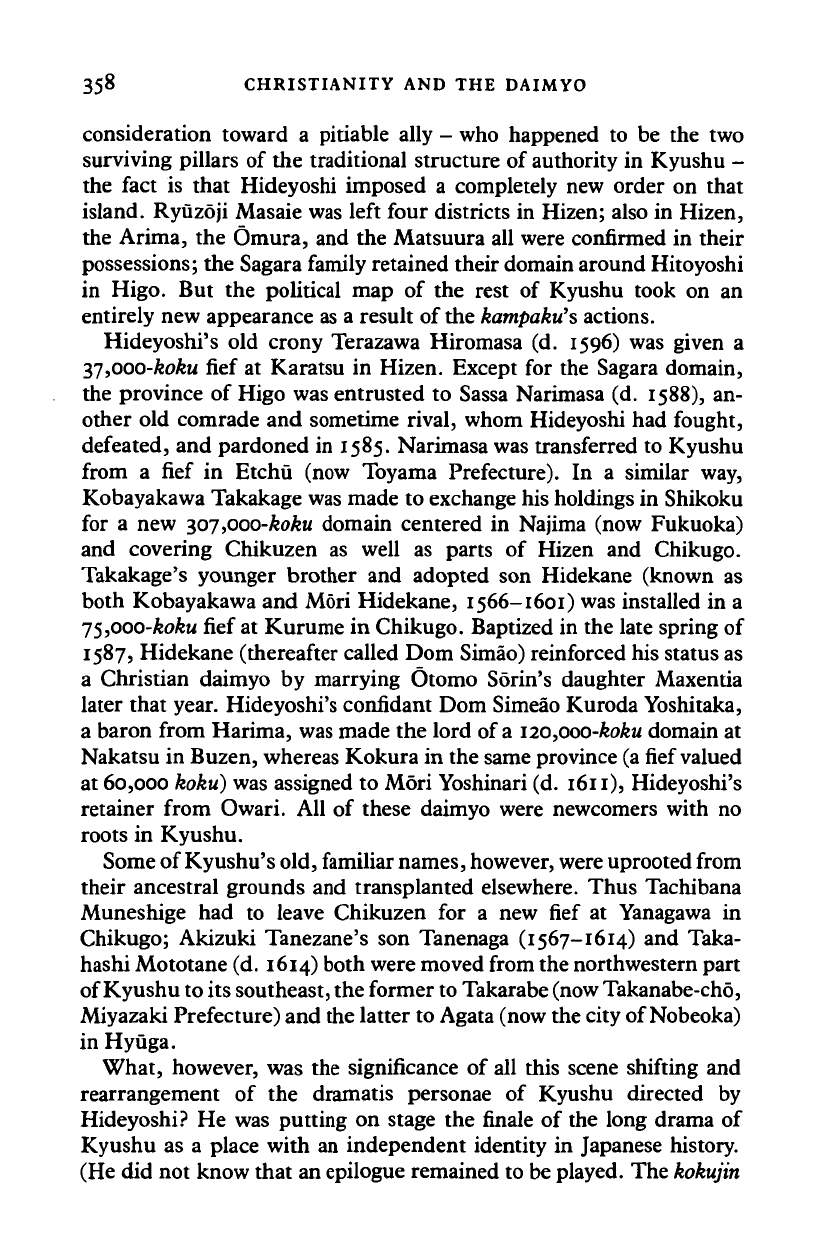
358 CHRISTIANITY AND THE DAIMYO
consideration toward a pitiable ally - who happened to be the two
surviving pillars of the traditional structure of authority in Kyushu -
the fact is that Hideyoshi imposed a completely new order on that
island. Ryuzdji Masaie was left four districts in Hizen; also in Hizen,
the Arima, the Omura, and the Matsuura all were confirmed in their
possessions; the Sagara family retained their domain around Hitoyoshi
in Higo. But the political map of the rest of Kyushu took on an
entirely new appearance as a result of the
kampaku's
actions.
Hideyoshi's old crony Terazawa Hiromasa (d. 1596) was given a
37,000-koku fief at Karatsu in Hizen. Except for the Sagara domain,
the province of Higo was entrusted to Sassa Narimasa (d. 1588), an-
other old comrade and sometime rival, whom Hideyoshi had fought,
defeated, and pardoned in 1585. Narimasa was transferred to Kyushu
from a fief in Etchu (now Toyama Prefecture). In a similar way,
Kobayakawa Takakage was made to exchange his holdings in Shikoku
for a new 307,000-koku domain centered in Najima (now Fukuoka)
and covering Chikuzen as well as parts of Hizen and Chikugo.
Takakage's younger brother and adopted son Hidekane (known as
both Kobayakawa and Mori Hidekane, 1566-1601) was installed in a
j$,ooo-koku fief at Kurume in Chikugo. Baptized in the late spring of
1587,
Hidekane (thereafter called Dom Simao) reinforced his status as
a Christian daimyo by marrying Otomo Sorin's daughter Maxentia
later that year. Hideyoshi's confidant Dom Simeao Kuroda Yoshitaka,
a baron from Harima, was made the lord of
a 120,000-koku
domain at
Nakatsu in Buzen, whereas Kokura in the same province (a
fief
valued
at 60,000 koku) was assigned to Mori Yoshinari (d. 1611), Hideyoshi's
retainer from Owari. All of these daimyo were newcomers with no
roots in Kyushu.
Some of Kyushu's old, familiar
names,
however, were uprooted from
their ancestral grounds and transplanted elsewhere. Thus Tachibana
Muneshige had to leave Chikuzen for a new fief at Yanagawa in
Chikugo; Akizuki Tanezane's son Tanenaga (1567-1614) and Taka-
hashi Mototane (d. 1614) both were moved from the northwestern part
of Kyushu to its southeast, the former to Takarabe
(now
Takanabe-cho,
Miyazaki Prefecture) and the latter to Agata (now the city of Nobeoka)
in Hyuga.
What, however, was the significance of all this scene shifting and
rearrangement of the dramatis personae of Kyushu directed by
Hideyoshi? He was putting on stage the finale of the long drama of
Kyushu as a place with an independent identity in Japanese history.
(He did not know that an epilogue remained to be played. The
kokujin
Cambridge Histories Online © Cambridge University Press, 2008
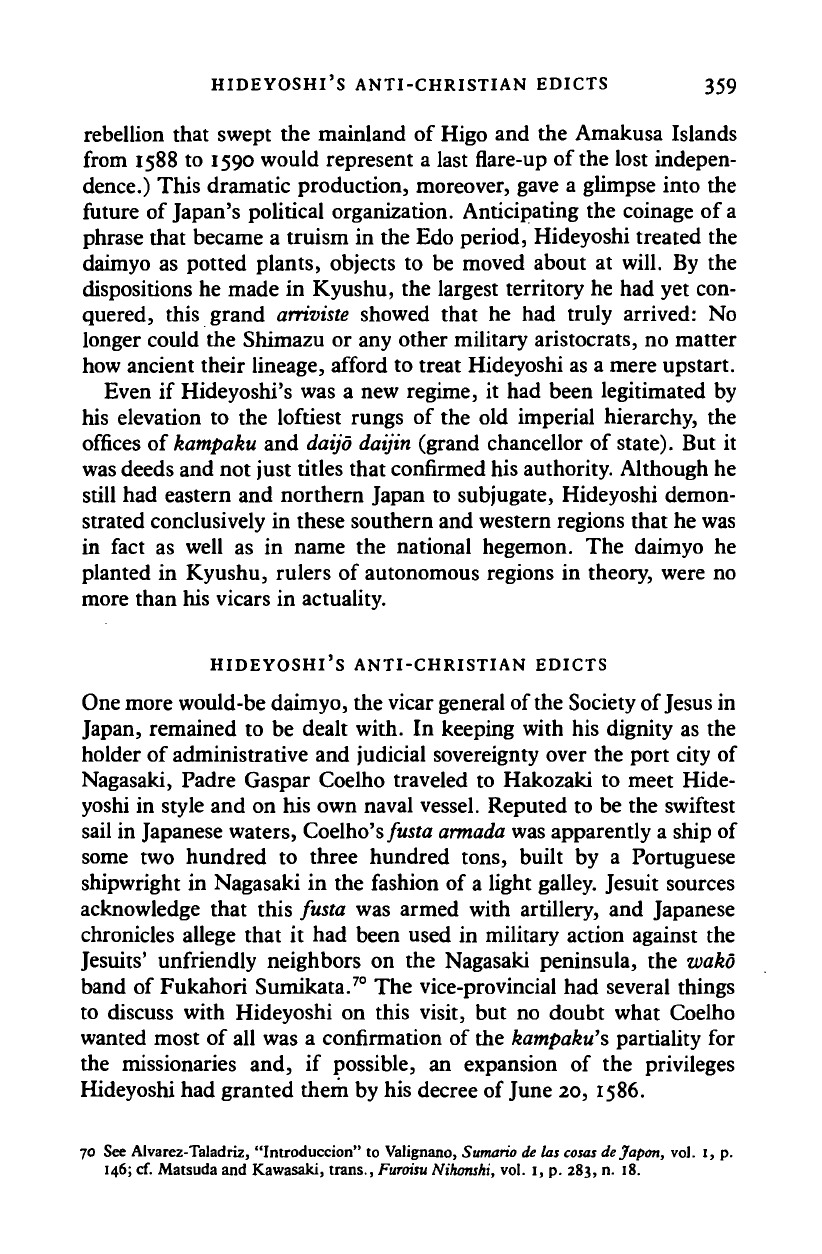
HIDEYOSHl'S ANTI-CHRISTIAN EDICTS 359
rebellion that swept the mainland of Higo and the Amakusa Islands
from 1588 to 1590 would represent a last flare-up of the lost indepen-
dence.) This dramatic production, moreover, gave a glimpse into the
future of Japan's political organization. Anticipating the coinage of
a
phrase that became a truism in the Edo period, Hideyoshi treated the
daimyo as potted plants, objects to be moved about at will. By the
dispositions he made in Kyushu, the largest territory he had yet con-
quered, this grand
arriviste
showed that he had truly arrived: No
longer could the Shimazu or any other military aristocrats, no matter
how ancient their lineage, afford to treat Hideyoshi as a mere upstart.
Even if Hideyoshi's was a new regime, it had been legitimated by
his elevation to the loftiest rungs of the old imperial hierarchy, the
offices of
kampaku
and
daijd daijin
(grand chancellor of state). But it
was deeds and not just titles that confirmed his authority. Although he
still had eastern and northern Japan to subjugate, Hideyoshi demon-
strated conclusively in these southern and western regions that he was
in fact as well as in name the national hegemon. The daimyo he
planted in Kyushu, rulers of autonomous regions in theory, were no
more than his vicars in actuality.
HIDEYOSHl'S ANTI-CHRISTIAN EDICTS
One more would-be daimyo, the vicar general of the Society of Jesus in
Japan, remained to be dealt with. In keeping with his dignity as the
holder of administrative and judicial sovereignty over the port city of
Nagasaki, Padre Gaspar Coelho traveled to Hakozaki to meet Hide-
yoshi in style and on his own naval vessel. Reputed to be the swiftest
sail in Japanese waters, Coelho's/wsra
armada
was apparently a ship of
some two hundred to three hundred tons, built by a Portuguese
shipwright in Nagasaki in the fashion of a light galley. Jesuit sources
acknowledge that this fusta was armed with artillery, and Japanese
chronicles allege that it had been used in military action against the
Jesuits' unfriendly neighbors on the Nagasaki peninsula, the wako
band of Fukahori Sumikata.
70
The vice-provincial had several things
to discuss with Hideyoshi on this visit, but no doubt what Coelho
wanted most of all was a confirmation of the kampaku's partiality for
the missionaries and, if possible, an expansion of the privileges
Hideyoshi had granted them by his decree of June 20, 1586.
70 See Alvarez-Taladriz, "Introduction" to Valignano, Sumario de las
cosas
de Japan, vol. 1, p.
146;
cf. Matsuda and Kawasaki, trans., Furoisu Nihonshi, vol. 1, p. 283, n. 18.
Cambridge Histories Online © Cambridge University Press, 2008
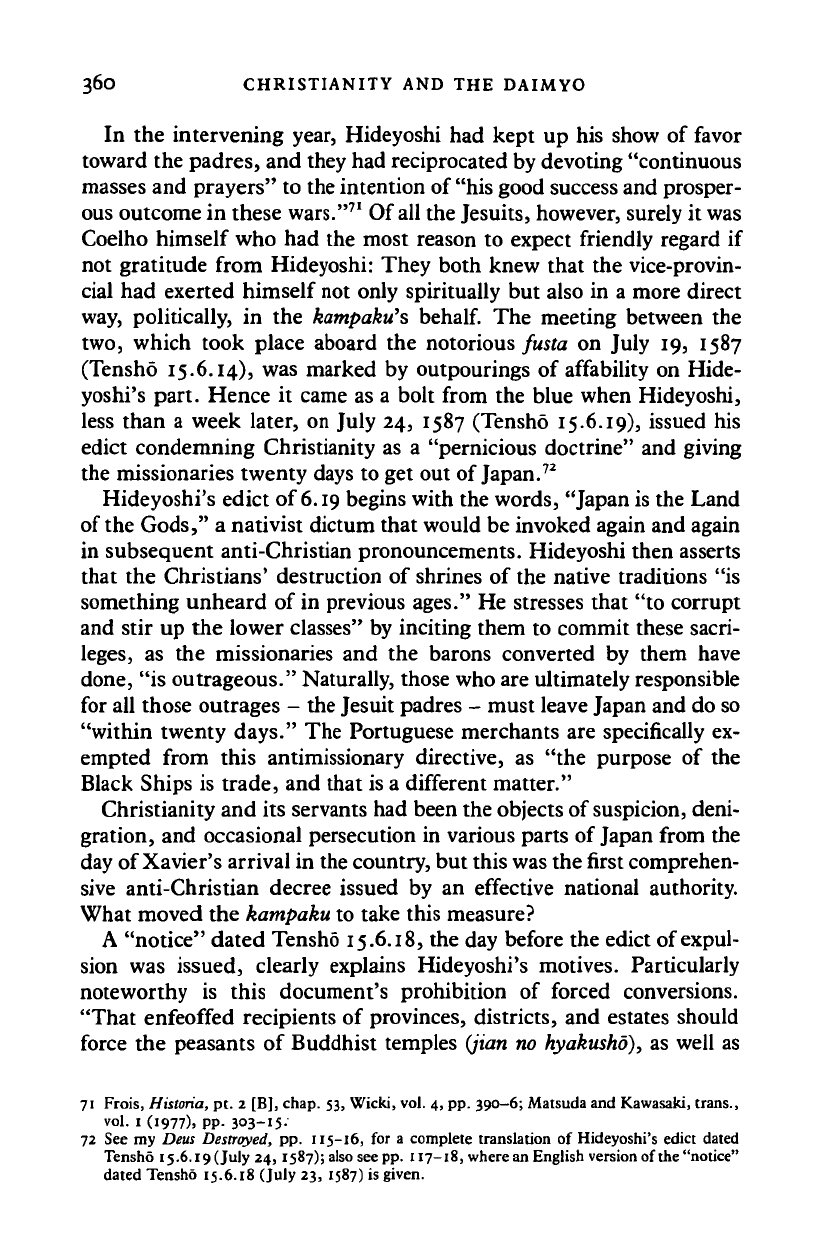
360 CHRISTIANITY AND THE DAIMYO
In the intervening year, Hideyoshi had kept up his show of favor
toward the padres, and they had reciprocated by devoting "continuous
masses and prayers" to the intention of "his good success and prosper-
ous outcome in these wars."
71
Of
all
the Jesuits, however, surely it was
Coelho himself who had the most reason to expect friendly regard if
not gratitude from Hideyoshi: They both knew that the vice-provin-
cial had exerted himself not only spiritually but also in a more direct
way, politically, in the kampakii's
behalf.
The meeting between the
two,
which took place aboard the notorious fusta on July 19, 1587
(Tensho 15.6.14), was marked by outpourings of affability on Hide-
yoshi's part. Hence it came as a bolt from the blue when Hideyoshi,
less than a week later, on July 24, 1587 (Tensho 15.6.19), issued his
edict condemning Christianity as a "pernicious doctrine" and giving
the missionaries twenty days to get out of Japan.
72
Hideyoshi's edict of
6.19
begins with the words, "Japan is the Land
of the Gods," a nativist dictum that would be invoked again and again
in subsequent anti-Christian pronouncements. Hideyoshi then asserts
that the Christians' destruction of shrines of the native traditions "is
something unheard of in previous ages." He stresses that "to corrupt
and stir up the lower classes" by inciting them to commit these sacri-
leges,
as the missionaries and the barons converted by them have
done, "is outrageous." Naturally, those who are ultimately responsible
for all those outrages - the Jesuit padres - must leave Japan and do so
"within twenty days." The Portuguese merchants are specifically ex-
empted from this antimissionary directive, as "the purpose of the
Black Ships is trade, and that is a different matter."
Christianity and its servants had been the objects of suspicion, deni-
gration, and occasional persecution in various parts of Japan from the
day of Xavier's arrival in the country, but this was the first comprehen-
sive anti-Christian decree issued by an effective national authority.
What moved the kampaku to take this measure?
A "notice" dated Tensho 15.6.18, the day before the edict of expul-
sion was issued, clearly explains Hideyoshi's motives. Particularly
noteworthy is this document's prohibition of forced conversions.
"That enfeoffed recipients of provinces, districts, and estates should
force the peasants of Buddhist temples (jian no
hyakusho),
as well as
71 Frois, Historia, pt. 2 [B], chap. 53, Wicki, vol. 4, pp. 390-6; Matsuda and Kawasaki, trans.,
vol. 1 (1977), pp. 3O3-I5-
72 See my Deus Destroyed, pp. 115-16, for a complete translation of Hideyoshi's edict dated
Tensho 15.6.19 (July 24, 1587); also see pp. 117-18, where an English version of the "notice"
dated Tensho 15.6.18 (July 23, 1587) is given.
Cambridge Histories Online © Cambridge University Press, 2008
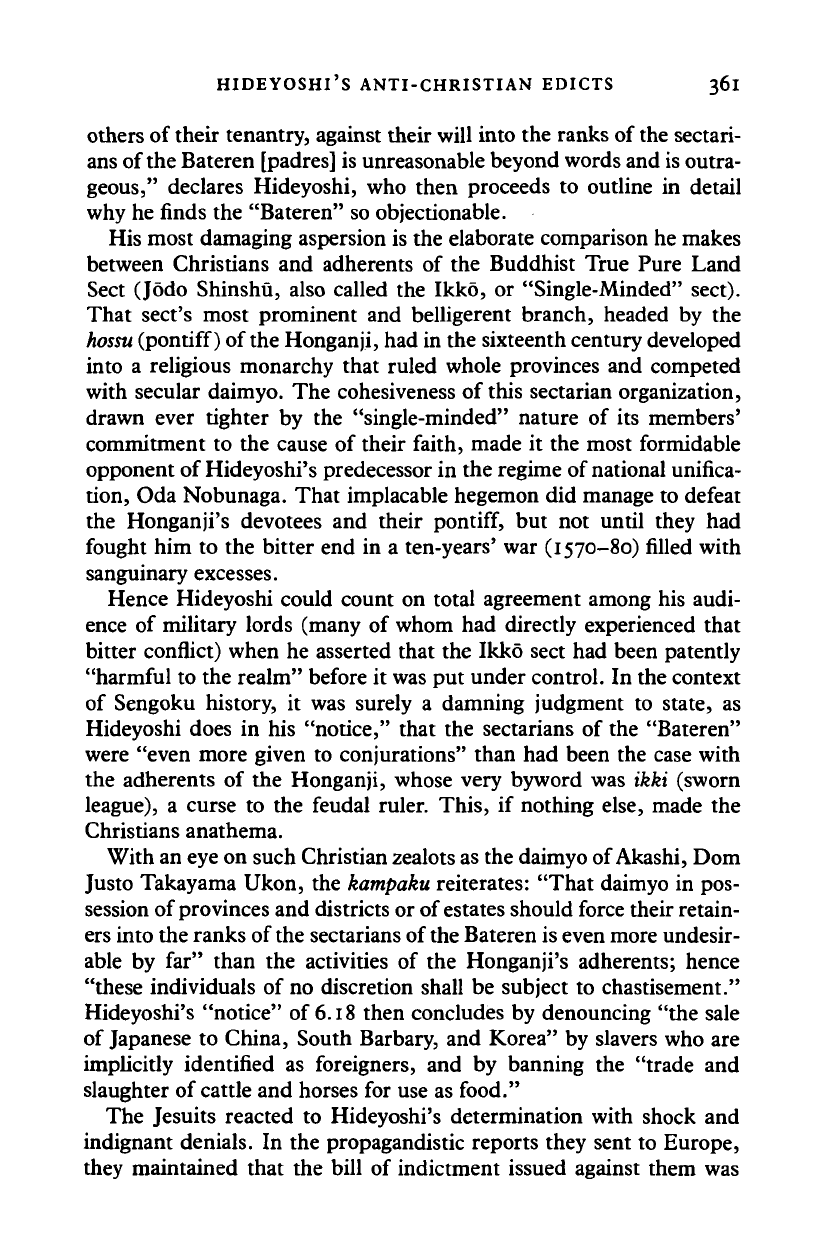
HIDEYOSHl'S ANTI-CHRISTIAN EDICTS 361
others of their tenantry, against their will into the ranks of the sectari-
ans of the Bateren [padres] is unreasonable beyond words and is outra-
geous,"
declares Hideyoshi, who then proceeds to outline in detail
why he finds the "Bateren" so objectionable.
His most damaging aspersion is the elaborate comparison he makes
between Christians and adherents of the Buddhist True Pure Land
Sect (Jodo Shinshu, also called the Ikko, or "Single-Minded" sect).
That sect's most prominent and belligerent branch, headed by the
hossu
(pontiff) of the Honganji, had in the sixteenth century developed
into a religious monarchy that ruled whole provinces and competed
with secular daimyo. The cohesiveness of this sectarian organization,
drawn ever tighter by the "single-minded" nature of its members'
commitment to the cause of their faith, made it the most formidable
opponent of Hideyoshi's predecessor in the regime of national unifica-
tion, Oda Nobunaga. That implacable hegemon did manage to defeat
the Honganji's devotees and their
pontiff,
but not until they had
fought him to the bitter end in a ten-years' war (1570-80) filled with
sanguinary excesses.
Hence Hideyoshi could count on total agreement among his audi-
ence of military lords (many of whom had directly experienced that
bitter conflict) when he asserted that the Ikko sect had been patently
"harmful to the realm" before it was put under control. In the context
of Sengoku history, it was surely a damning judgment to state, as
Hideyoshi does in his "notice," that the sectarians of the "Bateren"
were "even more given to conjurations" than had been the case with
the adherents of the Honganji, whose very byword was ikki (sworn
league), a curse to the feudal ruler. This, if nothing else, made the
Christians anathema.
With an eye on such Christian zealots as the daimyo of Akashi, Dom
Justo Takayama Ukon, the
kampaku
reiterates: "That daimyo in pos-
session of provinces and districts or of estates should force their retain-
ers into the ranks of the sectarians of
the
Bateren is even more undesir-
able by far" than the activities of the Honganji's adherents; hence
"these individuals of no discretion shall be subject to chastisement."
Hideyoshi's "notice" of 6.18 then concludes by denouncing "the sale
of Japanese to China, South Barbary, and Korea" by slavers who are
implicitly identified as foreigners, and by banning the "trade and
slaughter of cattle and horses for use as food."
The Jesuits reacted to Hideyoshi's determination with shock and
indignant denials. In the propagandists reports they sent to Europe,
they maintained that the bill of indictment issued against them was
Cambridge Histories Online © Cambridge University Press, 2008
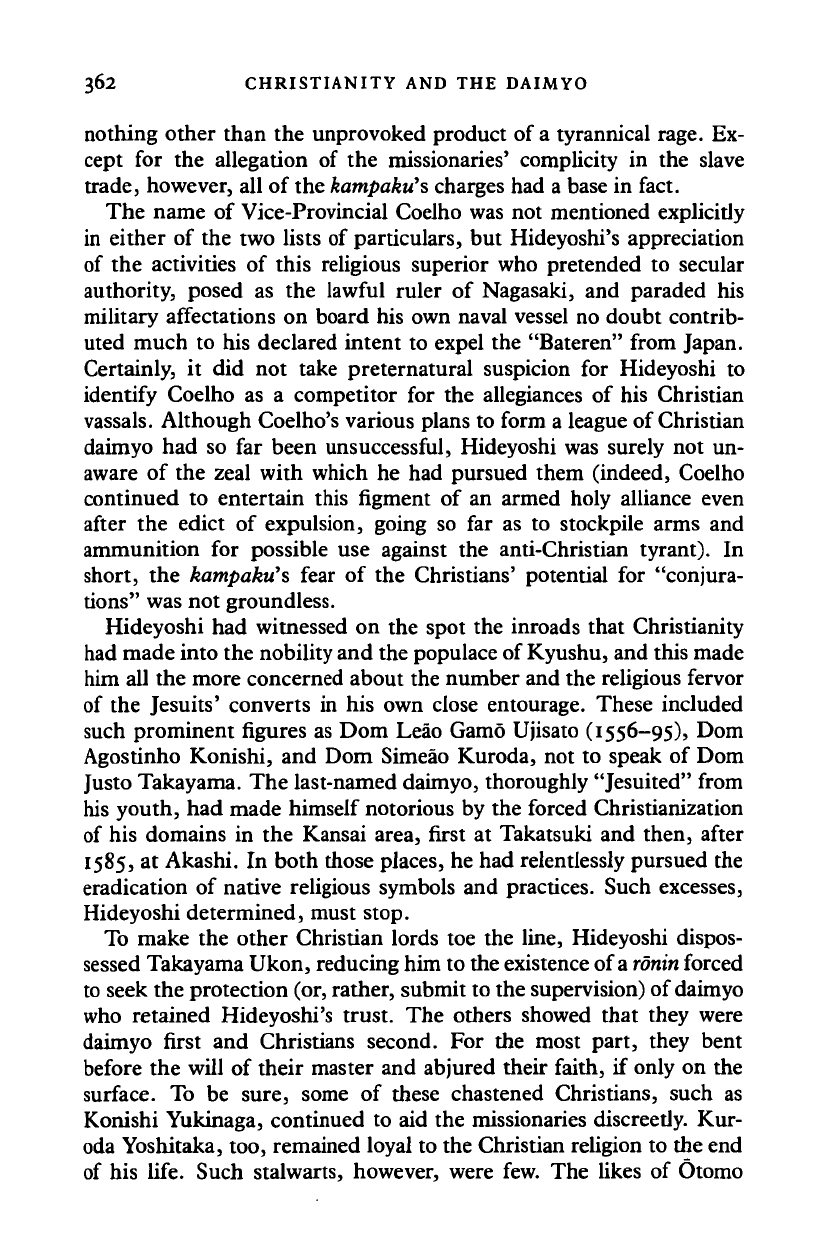
362 CHRISTIANITY AND THE DAIMYO
nothing other than the unprovoked product of a tyrannical rage. Ex-
cept for the allegation of the missionaries' complicity in the slave
trade, however, all of the
kampaku's
charges had a base in fact.
The name of Vice-Provincial Coelho was not mentioned explicitly
in either of the two lists of particulars, but Hideyoshi's appreciation
of the activities of this religious superior who pretended to secular
authority, posed as the lawful ruler of Nagasaki, and paraded his
military affectations on board his own naval vessel no doubt contrib-
uted much to his declared intent to expel the "Bateren" from Japan.
Certainly, it did not take preternatural suspicion for Hideyoshi to
identify Coelho as a competitor for the allegiances of his Christian
vassals. Although Coelho's various plans to form a league of Christian
daimyo had so far been unsuccessful, Hideyoshi was surely not un-
aware of the zeal with which he had pursued them (indeed, Coelho
continued to entertain this figment of an armed holy alliance even
after the edict of expulsion, going so far as to stockpile arms and
ammunition for possible use against the anti-Christian tyrant). In
short, the kampaku's fear of the Christians' potential for "conjura-
tions"
was not groundless.
Hideyoshi had witnessed on the spot the inroads that Christianity
had made into the nobility and the populace of Kyushu, and this made
him all the more concerned about the number and the religious fervor
of the Jesuits' converts in his own close entourage. These included
such prominent figures as Dom Leao Gamo Ujisato (1556-95), Dom
Agostinho Konishi, and Dom Simeao Kuroda, not to speak of Dom
Justo Takayama. The last-named daimyo, thoroughly "Jesuited" from
his youth, had made himself notorious by the forced Christianization
of his domains in the Kansai area, first at Takatsuki and then, after
1585,
at Akashi. In both those places, he had relentlessly pursued the
eradication of native religious symbols and practices. Such excesses,
Hideyoshi determined, must stop.
To make the other Christian lords toe the line, Hideyoshi dispos-
sessed Takayama Ukon, reducing him to the existence of a
ronin
forced
to seek the protection (or, rather, submit to the supervision) of daimyo
who retained Hideyoshi's trust. The others showed that they were
daimyo first and Christians second. For the most part, they bent
before the will of their master and abjured their faith, if only on the
surface. To be sure, some of these chastened Christians, such as
Konishi Yukinaga, continued to aid the missionaries discreetly. Kur-
oda Yoshitaka, too, remained loyal to the Christian religion to the end
of his life. Such stalwarts, however, were few. The likes of Otomo
Cambridge Histories Online © Cambridge University Press, 2008
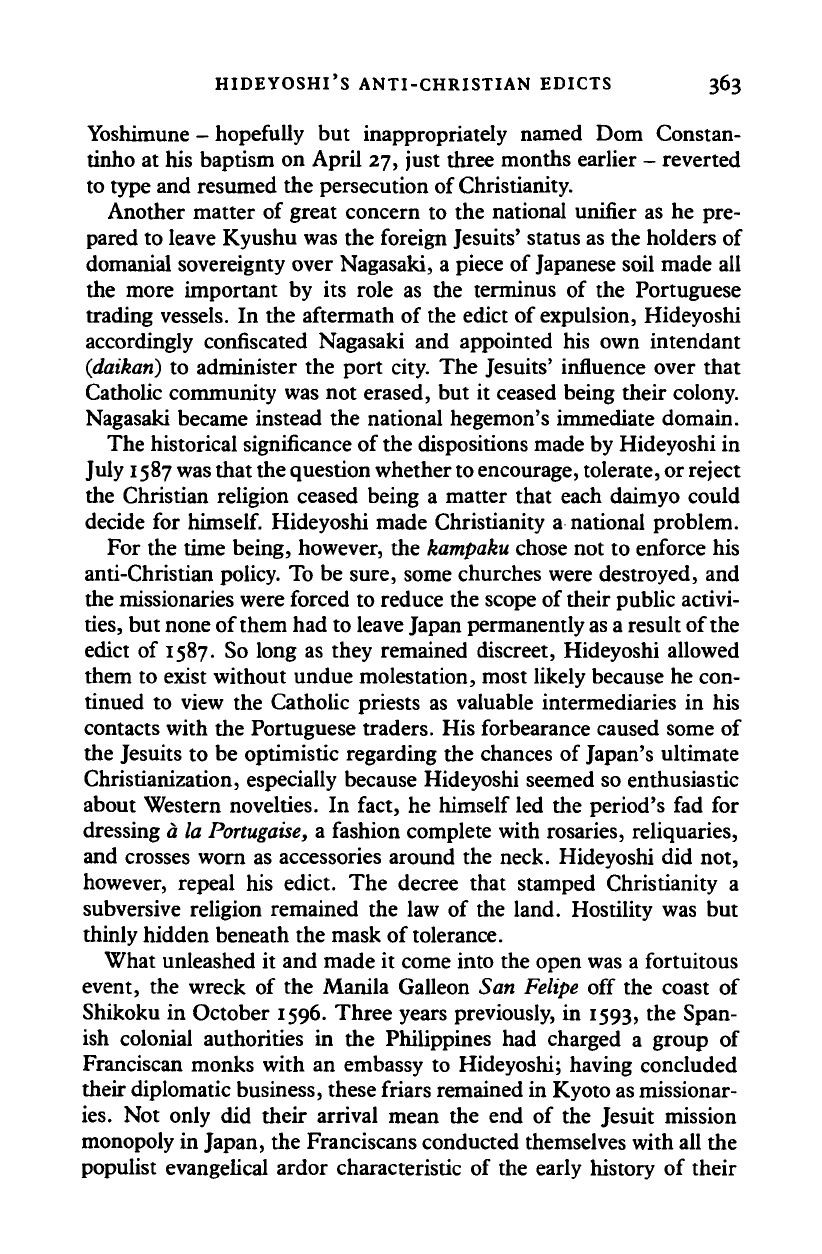
HIDEYOSHI'S ANTI-CHRISTIAN EDICTS 363
Yoshimune - hopefully but inappropriately named Dom Constan-
tinho at his baptism on April 27, just three months earlier - reverted
to type and resumed the persecution of Christianity.
Another matter of great concern to the national unifier as he pre-
pared to leave Kyushu was the foreign Jesuits' status as the holders of
domanial sovereignty over Nagasaki, a piece of Japanese soil made all
the more important by its role as the terminus of the Portuguese
trading vessels. In the aftermath of the edict of expulsion, Hideyoshi
accordingly confiscated Nagasaki and appointed his own intendant
(daikan)
to administer the port city. The Jesuits' influence over that
Catholic community was not erased, but it ceased being their colony.
Nagasaki became instead the national hegemon's immediate domain.
The historical significance of the dispositions made by Hideyoshi in
July
1587 was
that the question whether
to
encourage,
tolerate, or reject
the Christian religion ceased being a matter that each daimyo could
decide for
himself.
Hideyoshi made Christianity a national problem.
For the time being, however, the
kampaku
chose not to enforce his
anti-Christian policy. To be sure, some churches were destroyed, and
the missionaries were forced to reduce the scope of their public activi-
ties,
but none of them had to leave Japan permanently as a result of the
edict of 1587. So long as they remained discreet, Hideyoshi allowed
them to exist without undue molestation, most likely because he con-
tinued to view the Catholic priests as valuable intermediaries in his
contacts with the Portuguese traders. His forbearance caused some of
the Jesuits to be optimistic regarding the chances of Japan's ultimate
Christianization, especially because Hideyoshi seemed so enthusiastic
about Western novelties. In fact, he himself led the period's fad for
dressing a la
Portugaise,
a fashion complete with rosaries, reliquaries,
and crosses worn as accessories around the neck. Hideyoshi did not,
however, repeal his edict. The decree that stamped Christianity a
subversive religion remained the law of the land. Hostility was but
thinly hidden beneath the mask of tolerance.
What unleashed it and made it come into the open was a fortuitous
event, the wreck of the Manila Galleon San
Felipe
off the coast of
Shikoku in October 1596. Three years previously, in 1593, the Span-
ish colonial authorities in the Philippines had charged a group of
Franciscan monks with an embassy to Hideyoshi; having concluded
their diplomatic business, these friars remained in Kyoto as missionar-
ies.
Not only did their arrival mean the end of the Jesuit mission
monopoly in Japan, the Franciscans conducted themselves with all the
populist evangelical ardor characteristic of the early history of their
Cambridge Histories Online © Cambridge University Press, 2008
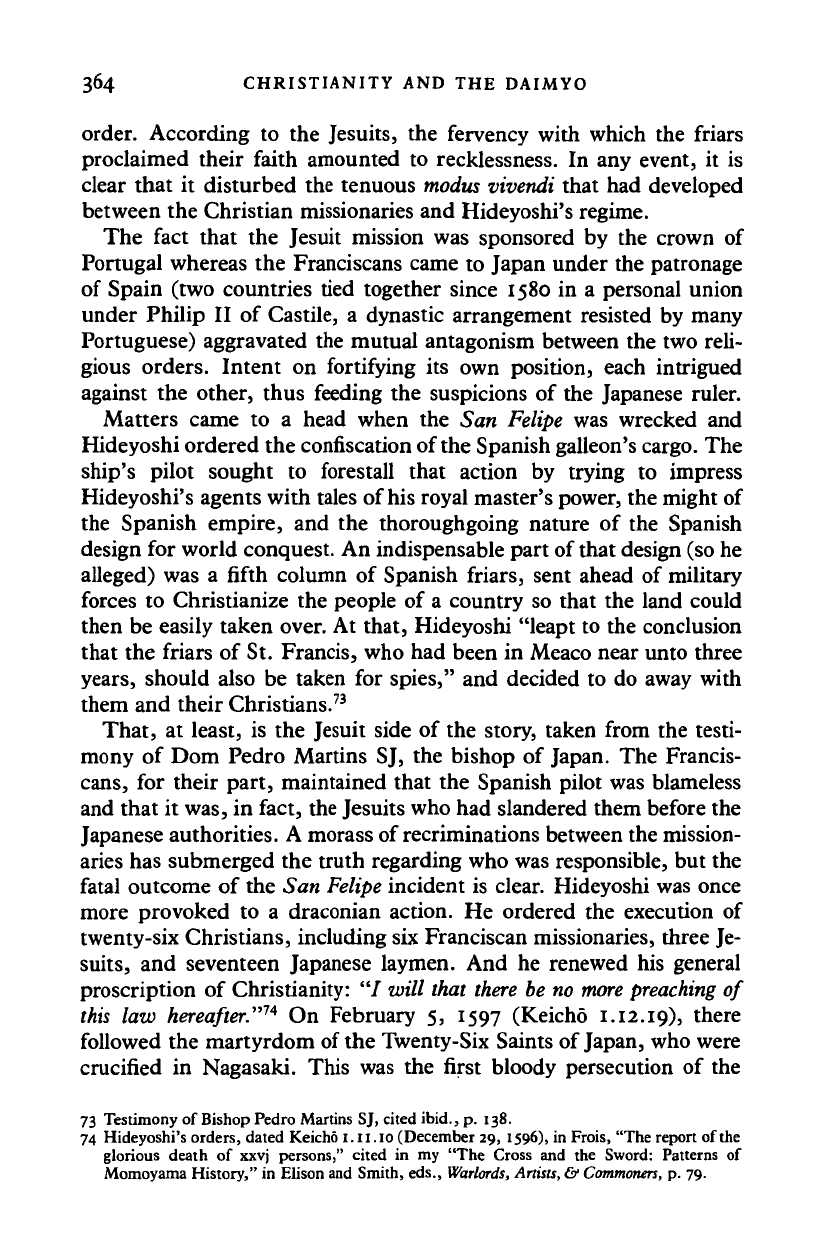
364 CHRISTIANITY AND THE DAIMYO
order. According to the Jesuits, the fervency with which the friars
proclaimed their faith amounted to recklessness. In any event, it is
clear that it disturbed the tenuous
modus
vivendi that had developed
between the Christian missionaries and Hideyoshi's regime.
The fact that the Jesuit mission was sponsored by the crown of
Portugal whereas the Franciscans came to Japan under the patronage
of Spain (two countries tied together since 1580 in a personal union
under Philip II of Castile, a dynastic arrangement resisted by many
Portuguese) aggravated the mutual antagonism between the two reli-
gious orders. Intent on fortifying its own position, each intrigued
against the other, thus feeding the suspicions of the Japanese ruler.
Matters came to a head when the San Felipe was wrecked and
Hideyoshi ordered the confiscation of the Spanish galleon's cargo. The
ship's pilot sought to forestall that action by trying to impress
Hideyoshi's agents with tales of
his
royal master's power, the might of
the Spanish empire, and the thoroughgoing nature of the Spanish
design for world conquest. An indispensable part of that design (so he
alleged) was a fifth column of Spanish friars, sent ahead of military
forces to Christianize the people of a country so that the land could
then be easily taken over. At that, Hideyoshi "leapt to the conclusion
that the friars of St. Francis, who had been in Meaco near unto three
years,
should also be taken for spies," and decided to do away with
them and their Christians.
73
That, at least, is the Jesuit side of the story, taken from the testi-
mony of Dom Pedro Martins SJ, the bishop of Japan. The Francis-
cans,
for their part, maintained that the Spanish pilot was blameless
and that it was, in fact, the Jesuits who had slandered them before the
Japanese authorities. A morass of recriminations between the mission-
aries has submerged the truth regarding who was responsible, but the
fatal outcome of the San
Felipe
incident is clear. Hideyoshi was once
more provoked to a draconian action. He ordered the execution of
twenty-six Christians, including six Franciscan missionaries, three Je-
suits,
and seventeen Japanese laymen. And he renewed his general
proscription of Christianity: "/ will that
there
be no
more preaching
of
this law
hereafter."
74
On February 5, 1597 (Keicho
1.12.19),
there
followed the martyrdom of the Twenty-Six Saints of Japan, who were
crucified in Nagasaki. This was the first bloody persecution of the
73 Testimony of Bishop Pedro Martins SJ, cited ibid., p. 138.
74 Hideyoshi's orders, dated Keicho
I.II.IO
(December 29, 1596), in Frois, "The report of the
glorious death of xxvj persons," cited in my "The Cross and the Sword: Patterns of
Momoyama History," in Elison and Smith, eds., Warlords, Artists, &
Commoners,
p. 79.
Cambridge Histories Online © Cambridge University Press, 2008
